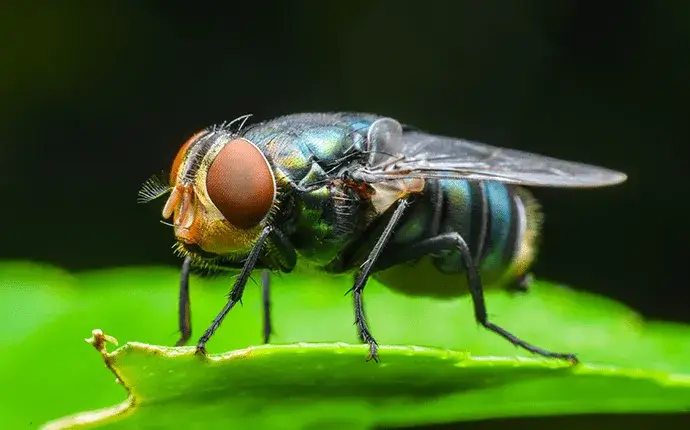
Blowflies in North Carolina
When you think of a fly, chances are you picture a blowfly. Blowflies are recognizable by their metallic blue, green, or black bodies, and these little pests make themselves known at every picnic and backyard party as the months get warmer. If you are dealing with a blowfly infestation in your home or business, A-1 Pest Control can help. We offer effective solutions to eliminate these pests and restore hygiene to your environment.

Where Do Blowflies Come From
Blowflies lay their eggs in decomposing organic material such as dead animals, garbage, and feces. The larvae, also known as maggots, feed on the rotting matter until they pupate and emerge as adult flies.
This breeding process typically occurs outdoors, but blowflies may enter homes or buildings if they detect odors from waste or other decaying materials. Once inside, they are often found near sources of food or waste.
Where Are Blowflies Found
Blowflies are found worldwide, thriving in both urban and rural environments. They are most often found in areas with high levels of organic waste, such as farms, garbage dumps, and slaughterhouses.
In North Carolina, the humid summer climate provides an ideal breeding ground for blowflies, which become more prevalent during the spring and summer. However, they can be a problem year-round in areas where temperatures remain mild.
Where Do Blowflies Reside In a House
Inside a home, blowflies are typically found near areas with decaying organic material, such as:
- Kitchens: They may be attracted to exposed food waste or spills.
- Garbage bins: Blowflies are drawn to trash containing organic waste, especially if bins are not sealed properly.
- Dead animals: If a rodent or bird dies inside a wall or attic, blowflies may be drawn to the carcass to lay eggs.
- Bathrooms or drains: Moist, organic buildup can attract blowflies to these areas.
Dead Animals
Blowflies are among the first insects to arrive at the scene of a dead animal. They are incredibly sensitive to the smell of decaying organic matter, which makes carcasses an ideal place for them to lay their eggs. Whether it's a small rodent trapped inside a wall, a bird that has died in your attic, or larger animals outdoors, the decomposition process attracts blowflies quickly.
Rotting Food
Rotting food is another major attraction for blowflies. Kitchen scraps, spoiled fruit, or meat that hasn't been properly disposed of can quickly attract these pests. Blowflies detect the odor of decaying organic matter and are drawn to it to feed and lay eggs. Fruit or vegetables left to rot on counters, or meat scraps left in the open, will invite blowflies into your home.
Animal Waste
Blowflies are attracted to pet or livestock feces, as these serve as prime sites for them to lay their eggs. The decomposing material provides an ideal food source for the larvae to develop. Pet owners who don’t regularly clean up after their animals may unknowingly be inviting blowflies into their yard or home.
Garbage
Unsealed garbage or compost bins provide an open invitation for blowflies. Garbage that contains food scraps, organic waste, or any type of decaying material emits strong odors that attract blowflies from afar. Compost piles that aren’t properly maintained, especially those containing meat or dairy products, can also be a breeding ground for blowflies.
How to Get Rid of Blowflies
Getting rid of blowflies requires a combination of sanitation and pest control efforts. A-1 Pest Control can help you eliminate blowflies through a few methods:
Remove Food Sources
The first step in eliminating blowflies is to remove their primary food sources. This includes disposing of decaying organic matter such as dead animals, spoiled food, and other rotting material that may attract blowflies.
Clean Thoroughly
Maintaining a clean environment is key to preventing blowfly infestations. Regularly clean areas where food is prepared or consumed, such as kitchen counters, sinks, and dining areas, to remove any food particles or spills that may attract flies. Trash bins should be emptied frequently and cleaned to avoid the buildup of odors that can lure blowflies.
Eliminate Entry Points
Blowflies can enter your home through small cracks or openings. To keep them out, it’s crucial to seal any cracks in walls, windows, or doors that could allow flies inside. Installing window and door screens is another effective method of preventing blowflies from entering your home, particularly in warmer months when doors and windows may be left open.
Professional Pest Control
For more severe infestations, professional pest control services may be necessary. A-1 Pest Control offers safe and effective treatments to eliminate blowflies from your home and prevent them from returning. Our team of experts uses advanced techniques and treatments designed specifically for blowfly infestations, ensuring long-lasting results. We also provide ongoing prevention plans to help keep your home fly-free in the future.
Blowflies FAQ
What is the difference between a fly and a blowfly?
While all blowflies are a type of fly, not all flies are blowflies. Blowflies are typically larger, with metallic-colored bodies, and are most commonly found around decaying matter, unlike houseflies, which are generally smaller and found in everyday environments like kitchens or garbage bins.
How long does a blowfly infestation last?
A blowfly infestation can last as long as there is a food source available. If left untreated, blowflies can continue to breed, with each life cycle taking around 7-10 days. Eliminating the source of the infestation is key to stopping the cycle.
Do blowflies cause any disease?
Yes, blowflies can spread diseases. As they feed on decaying matter, they can pick up harmful bacteria and pathogens, which they then transfer to surfaces or food when they land. Some of the diseases blowflies can spread include salmonella, E. coli, and dysentery.
Contact A-1 Pest Control for Blowfly Control in North Carolina
If you are experiencing a blowfly infestation in your home or business, contact A-1 Pest Control today for expert pest control. Our professional team can identify the source of the problem and recommend effective treatment plans to eliminate blowflies and prevent future infestations. We service Blowing Rock, Hendersonville, Hickory, Lenoir, Mooresville, and West Jefferson, North Carolina. Call us today at 828-481-9140 or fill out the form below for a FREE estimate!

